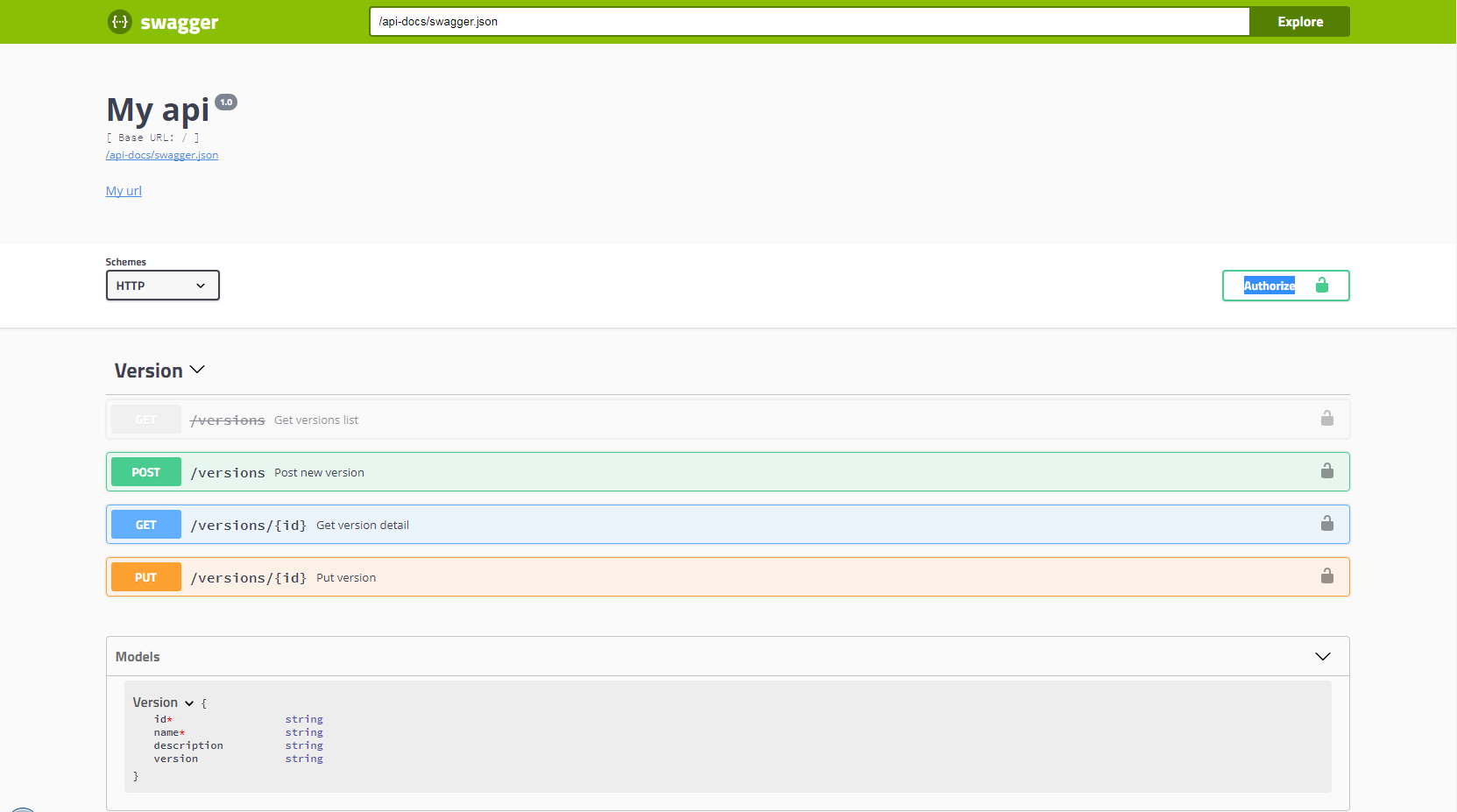
swagger-express-typescript
Automatically generate and serve swagger.json v2.0.
Getting started
First, install swagger-express-typescript.
npm install swagger-express-typescript --saveThe Basics
In the examples below, we use inversify-express-utils. inversify-express-utils is not required to work with swagger-express-typescript.
Step 1: configure express
import * as bodyParser from "body-parser";
import * as express from "express";
import "reflect-metadata";
import { Container } from "inversify";
import { interfaces, InversifyExpressServer, TYPE } from "inversify-express-utils";
import { VersionController } from "./version/version.controller";
import * as swagger from "swagger-express-typescript";
import { SwaggerDefinitionConstant } from "swagger-express-typescript";
const config = require ( "../config.json" );
// set up container
const container = new Container ();
// note that you *must* bind your controllers to Controller
container.bind<interfaces.Controller> ( TYPE.Controller )
.to( VersionController ).inSingletonScope().whenTargetNamed( VersionController.TARGET_NAME );
// create server
const server = new InversifyExpressServer ( container );
server.setConfig( ( app : any ) => {
app.use( '/api-docs/swagger' , express.static( 'swagger' ) );
app.use( '/api-docs/swagger/assets' , express.static( 'node_modules/swagger-ui-dist' ) );
app.use( bodyParser.json() );
app.use( swagger.express(
{
definition : {
info : {
title : "My api" ,
version : "1.0"
} ,
externalDocs : {
url : "My url"
}
// Models can be defined here
}
}
) );
} );
server.setErrorConfig( ( app : any ) => {
app.use( ( err : Error , request : express.Request , response : express.Response , next : express.NextFunction ) => {
console.error( err.stack );
response.status( 500 ).send( "Something broke!" );
} );
} );
const app = server.build();
app.listen( config.port );
console.info( "Server is listening on port : " + config.port );
Step 2: Decorate your models
@ApiModel( {
description : "Version description" ,
name : "Version"
} )
export class VersionModel {
@ApiModelProperty( {
description : "Id of version" ,
required : true,
example: ['123456789']
} )
id : number;
@ApiModelProperty( {
description : "" ,
required : true
} )
name : string;
@ApiModelProperty( {
description : "Description of version" ,
required : true
} )
description : string;
}Step 3: Decorate your controllers
@ApiPath({
path: "/versions",
name: "Version",
security: { basicAuth: [] }
})
@controller("/versions")
@injectable()
export class VersionController implements interfaces.Controller {
public static TARGET_NAME: string = "VersionController";
private data = [{
id: "1",
name: "Version 1",
description: "Description Version 1",
version: "1.0.0"
},
{
id: "2",
name: "Version 2",
description: "Description Version 2",
version: "2.0.0"
}];
@ApiOperationGet({
description: "Get versions objects list",
summary: "Get versions list",
responses: {
200: { description: "Success", type: SwaggerDefinitionConstant.Response.Type.ARRAY, model: "Version" }
},
security: {
apiKeyHeader: []
}
})
@httpGet("/")
public getVersions(request: express.Request, response: express.Response, next: express.NextFunction): void {
response.json(this.data);
}
@ApiOperationPost({
description: "Post version object",
summary: "Post new version",
parameters: {
body: { description: "New version", required: true, model: "Version" }
},
responses: {
200: { description: "Success" },
400: { description: "Parameters fail" }
}
})
@httpPost("/")
public postVersion(request: express.Request, response: express.Response, next: express.NextFunction): void {
if (!request.body) {
return response.status(400).end();
}
this.data.push(request.body);
response.json(request.body);
}
}Step 4: Test
Start your server and test on url : /api-docs/swagger.json
Extra
Serve swagger-ui in your API
You can serve swagger.json and swagger-ui in your API.
npm install swagger-ui-dist --saveCreate index.html in new directory "swagger".
<!-- HTML for static distribution bundle build -->
<!DOCTYPE html>
<html lang="en">
<head>
<meta charset="UTF-8">
<title>Swagger UI</title>
<link href="https://fonts.googleapis.com/css?family=Open+Sans:400,700|Source+Code+Pro:300,600|Titillium+Web:400,600,700"
rel="stylesheet">
<link rel="stylesheet" type="text/css" href="/api-docs/swagger/assets/swagger-ui.css">
<link rel="icon" type="image/png" href="/api-docs/swagger/assets/favicon-32x32.png" sizes="32x32"/>
<link rel="icon" type="image/png" href="/api-docs/swagger/assets/favicon-16x16.png" sizes="16x16"/>
<style>
html {
box-sizing: border-box;
overflow: -moz-scrollbars-vertical;
overflow-y: scroll;
}
*,
*:before,
*:after {
box-sizing: inherit;
}
body {
margin: 0;
background: #fafafa;
}
</style>
</head>
<body>
<svg xmlns="http://www.w3.org/2000/svg" xmlns:xlink="http://www.w3.org/1999/xlink"
style="position:absolute;width:0;height:0">
<defs>
<symbol viewBox="0 0 20 20" id="unlocked">
<path d="M15.8 8H14V5.6C14 2.703 12.665 1 10 1 7.334 1 6 2.703 6 5.6V6h2v-.801C8 3.754 8.797 3 10 3c1.203 0 2 .754 2 2.199V8H4c-.553 0-1 .646-1 1.199V17c0 .549.428 1.139.951 1.307l1.197.387C5.672 18.861 6.55 19 7.1 19h5.8c.549 0 1.428-.139 1.951-.307l1.196-.387c.524-.167.953-.757.953-1.306V9.199C17 8.646 16.352 8 15.8 8z"></path>
</symbol>
<symbol viewBox="0 0 20 20" id="locked">
<path d="M15.8 8H14V5.6C14 2.703 12.665 1 10 1 7.334 1 6 2.703 6 5.6V8H4c-.553 0-1 .646-1 1.199V17c0 .549.428 1.139.951 1.307l1.197.387C5.672 18.861 6.55 19 7.1 19h5.8c.549 0 1.428-.139 1.951-.307l1.196-.387c.524-.167.953-.757.953-1.306V9.199C17 8.646 16.352 8 15.8 8zM12 8H8V5.199C8 3.754 8.797 3 10 3c1.203 0 2 .754 2 2.199V8z"/>
</symbol>
<symbol viewBox="0 0 20 20" id="close">
<path d="M14.348 14.849c-.469.469-1.229.469-1.697 0L10 11.819l-2.651 3.029c-.469.469-1.229.469-1.697 0-.469-.469-.469-1.229 0-1.697l2.758-3.15-2.759-3.152c-.469-.469-.469-1.228 0-1.697.469-.469 1.228-.469 1.697 0L10 8.183l2.651-3.031c.469-.469 1.228-.469 1.697 0 .469.469.469 1.229 0 1.697l-2.758 3.152 2.758 3.15c.469.469.469 1.229 0 1.698z"/>
</symbol>
<symbol viewBox="0 0 20 20" id="large-arrow">
<path d="M13.25 10L6.109 2.58c-.268-.27-.268-.707 0-.979.268-.27.701-.27.969 0l7.83 7.908c.268.271.268.709 0 .979l-7.83 7.908c-.268.271-.701.27-.969 0-.268-.269-.268-.707 0-.979L13.25 10z"/>
</symbol>
<symbol viewBox="0 0 20 20" id="large-arrow-down">
<path d="M17.418 6.109c.272-.268.709-.268.979 0s.271.701 0 .969l-7.908 7.83c-.27.268-.707.268-.979 0l-7.908-7.83c-.27-.268-.27-.701 0-.969.271-.268.709-.268.979 0L10 13.25l7.418-7.141z"/>
</symbol>
<symbol viewBox="0 0 24 24" id="jump-to">
<path d="M19 7v4H5.83l3.58-3.59L8 6l-6 6 6 6 1.41-1.41L5.83 13H21V7z"/>
</symbol>
<symbol viewBox="0 0 24 24" id="expand">
<path d="M10 18h4v-2h-4v2zM3 6v2h18V6H3zm3 7h12v-2H6v2z"/>
</symbol>
</defs>
</svg>
<div id="swagger-ui"></div>
<script src="/api-docs/swagger/assets/swagger-ui-bundle.js"></script>
<script src="/api-docs/swagger/assets/swagger-ui-standalone-preset.js"></script>
<script>
window.onload = function () {
// Build a system
const ui = SwaggerUIBundle ({
url: "/api-docs/swagger.json",
dom_id: '#swagger-ui',
deepLinking: true,
presets: [
SwaggerUIBundle.presets.apis,
SwaggerUIStandalonePreset
],
plugins: [
SwaggerUIBundle.plugins.DownloadUrl
],
layout: "StandaloneLayout",
validatorUrl: null
});
window.ui = ui
}
</script>
</body>
</html>
Configure your server like that.
app.use( '/api-docs/swagger', express.static( 'swagger' ) );
app.use( '/api-docs/swagger/assets', express.static( 'node_modules/swagger-ui-dist' ) );Test it on url "/api-docs/swagger".

Project example
You can quickly test swagger-express-typescript with the project example example-swagger-express-typescript.
Features and API
- Installation
- Configuration
- @ApiModel
- @ApiModelProperty
- @ApiPath
- @ApiOperationGet
- @ApiOperationPost
- @ApiOperationPut
- @ApiOperationPatch
- @ApiOperationDelete
For any questions, suggestions, or feature requests
Help wanted
swagger-express-typescript wants additional maintainers! To maintain and continue to develop this young library, Please post in this issue.